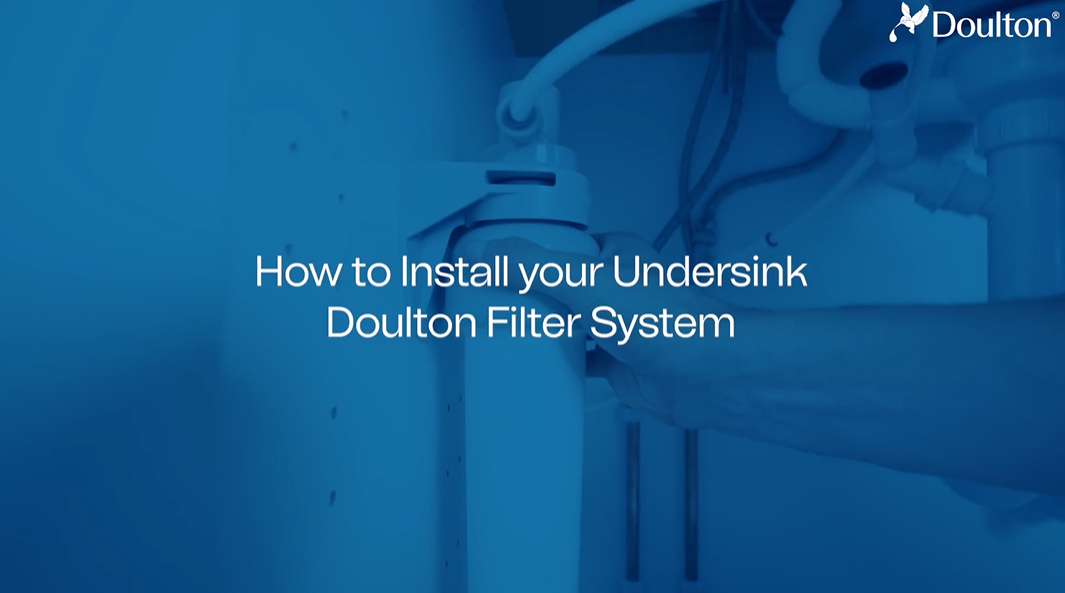With so many water filter options on the market, it can be overwhelming trying to determine the best choice for your needs, and budget. Water filters come in a range of types; including gravity-fed water filter systems, under sink, countertop, and more, each using different methods to reduce contaminants and give you better quality drinking water. But how do you select the right one?
For a quick solution you can head to our water quiz page and answer a few questions to find your perfect water filter from the Doulton range. Or, you can read on to discover more about different types of water filters available and what the best solution will be for your needs.
Key considerations when buying a water filter
How many people are using the water filter?
When choosing your water filter system, there are a few reasons why you may need to think about how many people are going to be using it on a daily basis. If you're looking for peace of mind for your entire family, a water filter system that acts as a central hub in the heart of your home can help to keep you all hydrated with very little effort. However, you may be looking for a water filter solution for personal use. If this is the case, then a smaller gravity filter system or water filter bottle may be more suitable.
The number of people that use the water filter may also change from time to time. For example, you also may want to use a filter system daily for you and your partner, but then also want to expand the number of people using it when you entertain at the weekends or for seasonal events. If this sounds like you, then a gravity filter system could be perfect, as you have the flexibility to place it where needed and can keep the water topped up accordingly.
What budget have you got to spend on a water filter system?
Of course, when it comes to spending money on anything for your home, cost can play its part. With water filter systems being a relatively new concept to many homes, it can be sometimes be difficult to gauge which option provides you with the best long term value for your money.
Some aspects that may help you to decide your budget could be factors such as: how many people are using the system, the location of the water filter system and the additional trust and support available. This could include the level of customer service and testing certificates, as an example. Some companies, such as Doulton Water Filters provide reassurance for their ceramic water filters through an in-house team of experts, alongside rigorous testing from bodies such as NSF - a recognised, organisation that develops standards and certifies products (including water treatment systems) for public health and safety.
How easy is the water filter system to set up and install?
The answer when it comes to ease of installation depends completely on the type of water filter system you choose. Gravity can filter systems are fantastic for a versatile option, as they can be set up and used in any location with even the lowest level of skills! They require no plumbing or electricity, so you can just set up the system and start to fill up as needed. For a tap-mounted countertop system, you also only need a very basic skillset to set up, as they're simply screwed onto the kitchen tap and operate via a small lever on the side.
When it comes to an under sink water filter system, these can vary in ease of installation depending on your plumbing set up. Some can be installed simply with very basic DIY skills and tools you will likely have already at home. However, if the plumbing under your sink seems a little bit more complex, a plumber may need to be called in. Even for a plumber, though, the job of installing an under sink water filter system is a very basic task and they can usually complete it within an hour.

Does the water filter system have any testing data or external certification?
As mentioned in the considerations when it comes to the cost of a water filter system, a key aspect that can play into the price and the trust can be the level of certification the company has available - alongside the transparency of the testing data. Brands such as Doulton have a wide range of both internal and third-party test data available that is easily accessed both via the website, or directly at NSF. Other brands may rely on internal testing to smaller volumes of water usage, which can be used within marketing messages. However, Doulton will only make claims based on verified testing data that they, and their customers, can trust.
Comparing Major Water Filter Types
There is a wide variety of water filter types available, ranging from simple jug filters to complex whole-house systems. The major technologies are summarized below based on how they work, strengths, limitations and relative costs.
| Filter type | Method | Pros | Cons | Cost | Best for |
|---|---|---|---|---|---|
| Activated Carbon Filter | Adsorption on carbon medium | Inexpensive, good for improving taste and odour, good flow rate, some are effective at reducing chemicals & metals, wide availability | Limited life span, doesn't reduce microbiological contaminants (unless a biocidal agent is incorporated) can easily become blocked without prefiltration | £15 - £50 (pitcher or tap filter); £100+ (under sink) | Basic water polishing |
| Reverse Osmosis | Forced through semi-permeable membrane | Reduces wide range of contaminants including metals and salts | Slow filtration rate, high wastage of water (typically for every litre of pure water 4 litres are wasted), high upfront cost, ‘empty’ tasting water as all the minerals are stripped from the water. Requires electrical power | £200 - £500 standard system installation | Addressing high contaminant issues |
| Ceramic Filter with an assortment of internal media | Water flow through a ceramic filter encounters multiple twists, turns and sharp angles due to the complex ceramic structure. Particles that may have penetrated the surface of the ceramic become trapped within the structure | Good balance of contaminant reduction for cysts, lead, asbestos, chemicals etc. dependant upon the internal treatment media. Requires no power and has a cleanable surface so you can restore the flow | More frequent filter replacement needed than RO | £95 - £200 (gravity system; £70 - £250 (under counter) | Modest filtration at affordable pricing |
| Ultraviolet (UV) | Exposure to UV light | No filter needed so no water pressure impact | Microbiological treatment only, requires electricity & prefiltration to prevent particulate shielding of organisms. No chemical treatment | £50 and up; low operating cost | Microbial and bacteria issues |
| Sediment Filter | Mechanical straining | Inexpensive pre-filter for other systems | Limited contaminant capture on its own | £10 - £40 cartridge | Pre-filtration when needed |
Key Takeaway
As the table shows, factors like contaminants in your water, desired filtration intensity, costs, ease of use and more dictate what filter type makes sense for your situation.


